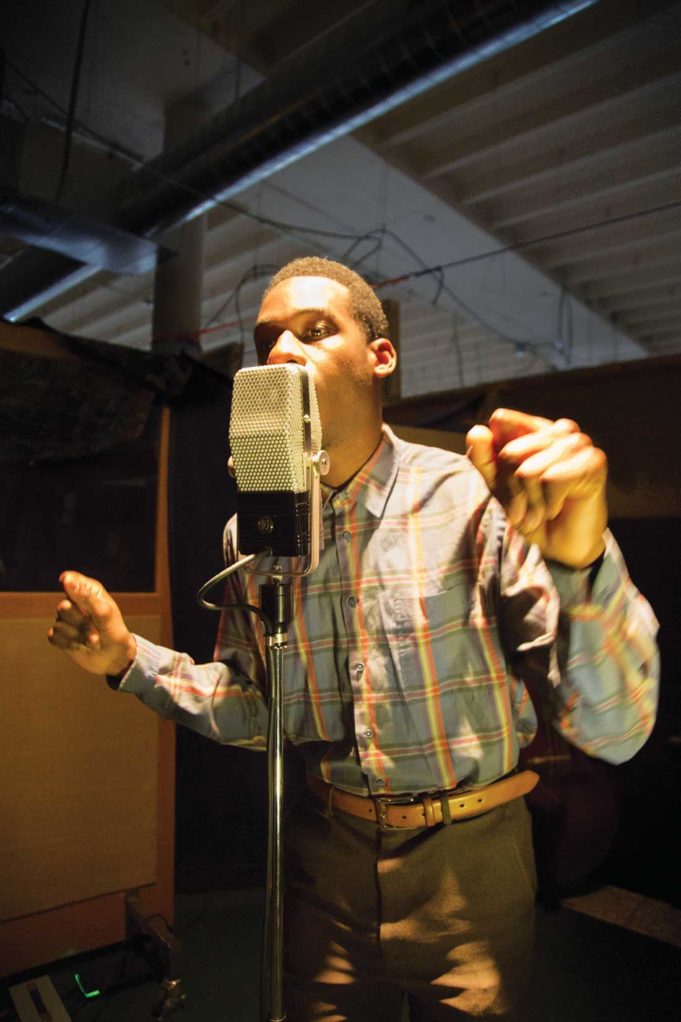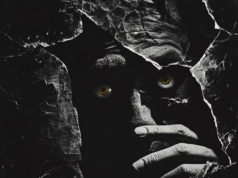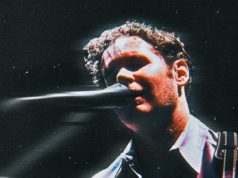Swaying tempos, ooo-ing backing vocals, splishy-splashy drums, echoing guitars, the mélange trebly yet layered to a heavenly thickness –– Coming Home sounds as if it had been recorded in 1957.
Only the 10 tracks that make up Leon Bridges’ debut album were laid down in 2014.
In an abandoned warehouse in a gentrifying part of Fort Worth, the city where the 27-year-old Atlanta native has been living for most of his life, co-producers Austin Jenkins and Josh Block had arranged their (mostly) vintage equipment: two 1960s-era reel-to-reel tape machines once used for Grateful Dead concerts; an Auditronics 501 console from Wally Heider Studios (American Beauty, Tupelo Honey, Closing Time); a Collins radio broadcast console from the mid 1940s; an assortment of old mics and amps; a laptop. Though Jenkins and Block had been playing music for decades, most recently and famously in the indie-rock quartet White Denim as lead guitarist and drummer respectively, neither had ever produced a record before. Both say they had been waiting for Bridges. A “godsend” is what they called him.
The slender, softly spoken African-American with the buoyant honey-brown tenor, not unattractive carrot-like nose, and ’50s fascination has also been pretty good for Columbia Records. Bridges’ Jenkins/Block-produced major label debut, also his first earnest recording effort, entered the weekly Billboard Top Album Sales chart in the summer of ’15 at No. 5, generating a “consumption total” (Billboard’s slightly disturbing term) of 42,000: 38,157 copies plus single sales and streams. Coming Home also earned a 2016 best R&B album Grammy nomination and, for Bridges, prime time on some of the biggest, most visible stages in the world (Austin City Limits, SNL, The Tonight Show Starring Jimmy Fallon). The singer-songwriter has essentially been on tour since last year, his itinerary speckled with gemlike, mostly historical venues (the Apollo in New York City, the Vic in Chicago, the Majestic in Detroit). Coming Home and Bridges’ performances prove what many of us may have suspected all along: that contemporary R&B can be about more than boasting, toasting, and fashion.
It can also be about history. Musically or socially. Intentionally or accidentally.
And this could be a problem. And it’s something to think about now that Bridges is reportedly writing new tunes.
*****
One of Coming Home’s catchiest tracks is “Twistin’ & Groovin’.” To the loosely chugging rhythm, its laze punctuated steadily by bright staccato strumming, Bridges describes one particularly nimble young woman.
“Sweet little girl from the Ninth Ward of New Orleans,” he croons. “The way she dancin’, you can see her from Tennessee.”
“Twistin’ & Groovin’ ” has nothing to do with the Twist itself. Before Chubby Checker popularized the corkscrewing move via his titular 1960 hit, young music lovers rocked and rolled in pairs and only in pairs. And in places like Alabama, Mississippi, and Texas, young music lovers rocked and rolled in pairs only with young music lovers who had the same skin color as them. Ropes or other kinds of barriers separated the dance floors at many Southern sock hops at least until the late 1960s: whites on one side, blacks on the other.
In Bridges’ song, he gets the individualized-dancing part right. The groovin’ feet belong to that sweet little New Orleanian with “legs long as the bayou trees” and no one else. Along with a distinct lack of sleepin’ daddies, prowling mamas, and wanton little sisters, “Twistin’ & Groovin’ ” doesn’t have any calls to action, no giddy pleas to unite or revolt. The rest of the album is equally apolitical, equally ahistorical.
But you can’t listen to Bridges’ music without turning to politics and history, since they’re everywhere, constantly, leering over our shoulders, breathing heavily, chewing a banana. Could a young non-black man dressed in sport knits, high-waisted pants, and polished loafers, his shiny hair high and tight, singing into a Neumann U67 about frottage over scat harmonies and to-ing-and-fro-ing rhythms, the kinds of sounds that can’t help but broadcast the deadly context in which they thrived –– the segregated United States –– could this guy have gotten away with putting out something like Coming Home?
Probably not.
Vintage R&B was a product –– an African-American-created product –– of the day’s mores and technology. For all of the too frequently fatal nonsense that Black America (and Native America and Latino America and Asia America and America America) has had to put up with from the white majority, especially in the tumultuous 1950s and early ’60s, an African-American needed to be the first to step into the polished loafers left by Sam Cooke and Otis Redding. Black America deserved that courtesy. Enter: Leon Bridges. (On the microphone isn’t the only place where he has great timing, apparently.)
And millions of music lovers –– of every color –– were apparently desperate for his arrival.
For years, critics have been bemoaning R&B’s death. Just a couple of years ago, the website Clutch published “8 Reasons Why Hip-Hop/R&B Is Officially Dead.” You can go down the list and check off a few factors that protect Bridges from liability. In Reason No. 2, the author says that R&B and hip-hop have received “all-white makeovers.” Unlike Iggy Azalea, Robin Thicke, and Justin Timberlake, three of the most popular offenders, Bridges is definitely black. In Reason No. 3, the author writes that R&B and hip-hop have “coalesced into a single genre.” Bridges’ music is about as far from hip-hop as classical music and heavy metal can get. One more: Reason No. 5: “All artists sound the same.” There is nobody in this dimension or the fifth doing what Bridges is doing. Period.
Looking for an R&B savior? Look no further than the Fort.
*****
To bring to life Bridges’ grooving, old fashioned-sounding ruminations on love, heavy petting, spirituality, heavy petting, and heavy petting, Jenkins and Block set out to recreate the vibe –– and the sound –– of “You Send Me,” “Having a Party,” “The Dock of the Bay,” and “What’d I Say,” out of pure respect and admiration for them and other soul/R&B nuggets of yesteryear. The tack worked. Really well. Jeff Dazey, Bridges’ saxophonist, told me not too long ago that most of the faces he sees at shows are young (late teens to early 30s), but at the same time baby boomers may swear that Bridges played their senior prom. They may even wipe a bittersweet tear from their eyes recounting the non-memory.
Nostalgia is a helluva drug. Andy Borowitz, who co-created the ’90s TV hit The Fresh Prince of Bel-Air, recently told Variety that longing for home (temporal or even physical) is fueled by the nagging sensation that “the past was awesome and the present sucks.”
However, the past to which Bridges harks –– indirectly but perfectly –– was not awesome. It was so anti-awesome that it is something of a black eye on a face already violently tenderized by Muhammad Ali.
Knowing Bridges personally, albeit from a professional distance, I can say that he understands the nuances of history but simply chooses to brush them off. I’ve seen him dressed in his Mad Men best, as always, smile away comments lobbed over the bar of a popular local watering hole by a young African-American bartender: “Those weren’t good times for our people, Leon!”
Bridges is so consumed with his music –– writing it and performing it and, now, dancing to it in packed houses across the globe –– that as long as what comes from his voice and guitar sounds lovely, he is satisfied. As he should be.
No matter what anyone says, thinks, or feels, you cannot disparage Bridges’ songs. They are that good. The spellbinding title track, a scorching ballad pivoting on a sumptuous one-line chorus (“Wanna be arou-ah-ouuund, girl”), is just one of several moody pop gems on the album.
Think about it: It is 2016, and a young black man is singing about the Twist un-ironically. That is mostly because the high quality of his tunes has allowed us to believe him, to trust his music, to trust that he’s not trying to pull one over on us. Coming Home is real music by real musical badasses. End of discussion.
But another possible reason young Leon can twisty, twisty, twisty without making us snicker is that the 1950s and early ’60s now seem pretty tame and psychologically unpacked to us. They certainly do not loom as ponderously as they did in the 1970s and ’80s, when the cultural conversation was dominated by ’50s- and ’60s-born artists/tastemakers, some with melancholy spirits to exorcise (Grease, Happy Days/Laverne & Shirley, Sha Na Na), others with Cold War scores to settle (The Outsiders, “Born in the ’50s,” Driving Miss Daisy). The ’50s/’60s are so far in the past that they are now either misremembered or caricaturized beyond recognition (Carol, Mad Men, The King’s Speech, Go Set a Watchman, The Imitation Game, Brooklyn, Masters of Sex). Also, the present is so sucky that we don’t care where we are transported to as long as it is not the terroristic now. Six million people watch Game of Thrones every week in-season. GoT’s a show about sword-fighting, dragons, and being impossibly good-looking. Six million people. That’s a lot of pimply faced tweens jumping around in their parents’ basements, flinging around bath-towel capes and wielding paper towel-tube swords, every Sunday night in the spring and summer.
Or maybe that massive number of watchers includes a few adults in an unstable world who want only, for a merciful minute, to escape reality. Grueling, painful, terroristic reality.
Like Bran Stark, Leon Bridges, who fine-tuned his chops playing open-mic nights around Fort Worth for a couple of years before bumping into Jenkins and Block, does have mystery working for him. There probably aren’t many twentysomethings who share his affinity for a time that even people born in the 1950s/early ’60s are probably over.
Well, make that “most” people born in the ’50s.
“There’s not a sour pitch,” said my hip 75-year-old mother after listening to Coming Home for the first time last month. “I love how the last words trail off, real soft. It’s just sweet. There’s not one wrong note. … It just brought me back.”
Last year, Bridges told me he was “super-happy” with Coming Home. “I love [Jenkins’] vision to get the tracks sounding exactly like they came out in the ’50s and ’60s,” the singer-songwriter said.
If Leon Bridges is as committed to historical accuracy as Coming Home suggests, his next album will be “Dance to the Music”-esque.
Which wouldn’t be bad thing. Nobody’s doing that sound either.













Nice writing! Really enjoyed reading this.
You mentioned that Leon’s next album could be “Dance to the Music”-esque. That’s interesting, but I like to hope that his next album heads further into a direction that you hinted at earlier in your story. Because of the chaos currently happening in the streets of the United States, I hope Leon’s next album can incorporate the cultural zeitgeist, while still paying homage to the past. Kendrick Lamar’s “To Pimp A Butterfly” meets Marvin’s “What’s Going On?” meets Sly’s “There’s A Riot Going On”…if you catch my drift. (smiles)
Thank you, V.M. But I’m always leery of criticizing minority artists for not doing enough for their communities. I think that at the point art becomes activism for activism’s sake, the artist comes off as fraudulent. If Leon isn’t feeling it, he isn’t feeling it, and that’s OK. But I hear what you’re saying.